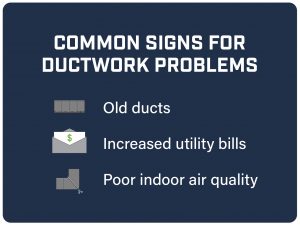 The condition of your ductwork is crucial to the effectiveness of your commercial or residential HVAC system. Problems with your air ducts can hinder the overall function of your HVAC system, causing the unit to work harder than needed. This can result in lower energy efficiency and poor air quality.
The condition of your ductwork is crucial to the effectiveness of your commercial or residential HVAC system. Problems with your air ducts can hinder the overall function of your HVAC system, causing the unit to work harder than needed. This can result in lower energy efficiency and poor air quality.
While ductwork needs maintenance to ensure proper output, can HVAC ductwork go bad? Your local HVAC contractor answers this important question and provides details how ductworks function.
Ductwork Details from Your Portland & Beaverton HVAC Installers
Our Beaverton and Portland HVAC company is often asked if ductwork can go bad. What does this mean? How long does residential and commercial ductwork last? What are steps you can take to ensure a healthy HVAC system? To address these concerns, it’s necessary to learn more about the function of ducts.
Ductwork 101
Ductwork is engineered to distribute airflow from your HVAC system to your entire residential or commercial building. In simple terms, hot or cool air is extracted from your entire building into the HVAC unit where it then gets heated or cooled and recycled into your property via the ducts. Your HVAC goes through this cycle continuously to ensure ideal internal temperatures.
Think of ducts as air conduits that allow air a pathway to and from your HVAC unit. With that in mind, the straighter and shorter the track of the duct is, the better the air flow. In addition, any twists, blockages, and debris in your ductwork will impede optimum air flow. Therefore, it is important to make sure your ducts are properly cleaned and professionally installed for maximum performance.
So, Can Your Home or Business’s Ductwork Go Bad?
 While you can think of ductwork as pathways that air travels through, that doesn’t necessarily mean they are passive elements in the air conditioning and heating cycle. As air moves through the ducts, they can shift, expand, and contract. Winter heating causes the ducts to expand and summer cooling makes them contract.
While you can think of ductwork as pathways that air travels through, that doesn’t necessarily mean they are passive elements in the air conditioning and heating cycle. As air moves through the ducts, they can shift, expand, and contract. Winter heating causes the ducts to expand and summer cooling makes them contract.
These movements put internal stress on the metal of the ductwork. While they don’t cause the system to go bad, per se, they will cause duct deterioration over time. What effect does this have on your ductwork? Seams can pull apart and ductwork can become detached, which impedes proper heating and cooling. This also opens the door to debris and water condensation, which can lead to rust.
Common Signs for Ductwork Problems
Now that you know the importance of having healthy ductwork, how can you tell if your ducts are experiencing problems?
- Old ducts: If your residential or commercial ductwork is over 15 years old, and you haven’t performed routine maintenance, you might have deterioration in your ducts.
- Increased utility bills: If your utility bills are higher than expected, it could be a result of leaky or obstructed ducts.
- Poor indoor air quality: Gaps in your ducts can let irritants like pollen and dust into your residential or commercial property. This can not only aggravate allergies or asthma, but it can cause damage to your HVAC unit.
If you notice any of the above symptoms, let your HVAC contractor know right away to prevent any further damage.
How Long Does Ductwork Last Before It Needs Replacing?
Even well-maintained ducts might eventually need to be replaced. How much life can you get out of your HVAC system before installing a new one? The good news is most ductwork lasts approximately 10 to 15 years.
If your ducts are older than 15 years, you might consider a complete replacement, or you might be able to just replace some of the components. An HVAC professional can perform an examination and determine the best solution.
Your HVAC Ductwork Specialists in Beaverton and Portland
AAA Heating and Cooling serves the Beaverton and Portland areas. We perform routine maintenance to keep your ducts in top shape. We also provide HVAC repair and complete installation. Contact us today for all your ductwork and HVAC needs.